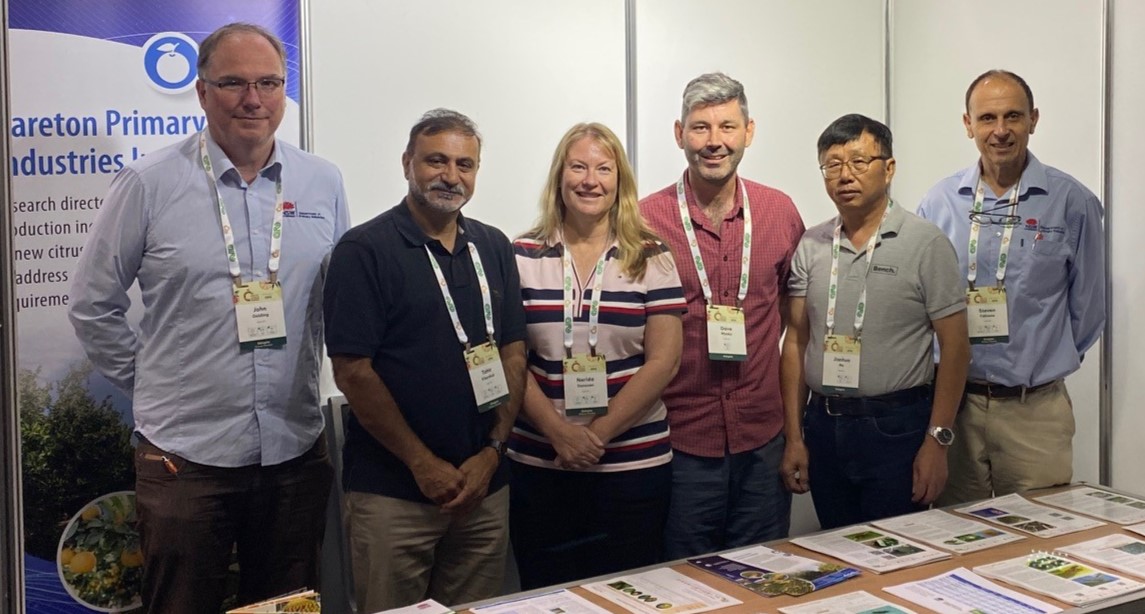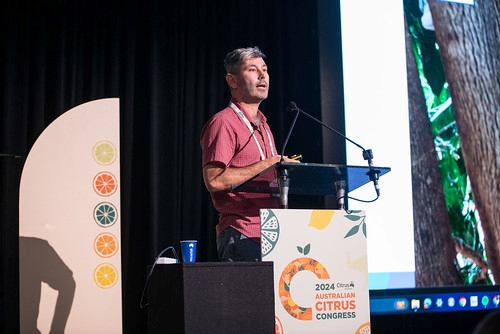
NSW DPI showcasing citrus research
The NSW DPI citrus research and extension team, the largest in Australia, were well-represented at the inaugural Australian Citrus Congress on the Sunshine Coast, QLD in early 2024.
The Congress brought together industry leaders in citrus research to discuss research, development and the outcomes transforming the citrus industry.

Leader in Southern Horticulture at NSW DPI Myles Parker said citrus is an important horticultural industry in NSW with a production area of around 13,000 hectares, representing approximately 40% of total Australian production.
“Our commitment to citrus research and development has had a significant impact on the productivity and profitability of the citrus industry,” Mr Parker said.
NSW DPI’s research staff have delivered groundbreaking research over many years in areas such as rootstocks and variety testing, crop and canopy management, and integrated pest and disease management, many of these projects with industry partners including Citrus Australia and Hort Innovation.
NSW DPI Development Officers also play an important extension role in the citrus industry by delivering the knowledge and application of this research to growers, developing guides and other resources, hosting field days and supporting growers with issues and challenges.
NSW DPI had a major presence at the Congress hosting an exhibition booth, delivering workshops on maintaining fruit quality post farmgate, presenting posters and sessions on various NSW DPI delivered projects including disease management, rootstock health, postharvest management and varieties.
The Congress commenced with a Biosecurity Symposium focusing on huánglóngbìng disease (HLB).
NSW DPI Entomologist Dr Jianhua Mo presented on the HLB preparedness project, funded by the Australian Centre for International Agricultural Research and Hort Innovation.
“HLB (Huanglongbing, or citrus greening disease) is an incurable disease of citrus that leads to tree decline and death. It is present in southeast Asia but currently absent in Australia.
“This project is leveraging understanding from around the world on HLB so our citrus industry is prepared for future incursions, as well as investing in management options including the use of HLB-tolerant rootstocks, high-density planting systems, repellents against the vector, and best traps and lures to monitor the vector,” said Dr Mo.
Dr Tahir Khurshid, NSW DPI Research Physiologist, presented an update on the HLB rootstock component of a new project "Evaluation of new rootstocks for the Australian citrus industry” recently funded by Hort Innovation.
“The rootstocks were budded in spring 2023, and last year we began to test them across different soil conditions,” said Dr Khurshid.
The rootstock trials will be established in five states of Australia, although most of the trials will be in NSW, including four extensive trials at NSW DPI’s Dareton Primary Industries Institute and the Griffith Centre for Irrigated Agriculture trial which will be established in spring 2024.
NSW DPI researchers and officers presented on the following projects:
Dr Nerida Donovan – Citrus Pathologist
- Australian activities on graft transmissible diseases and the importance of high health budwood.
Nerida presented an overview of how we manage graft-transmissible citrus diseases in Australia and how we are preparing for the arrival of exotic diseases, such as HLB, to reduce their impact.
Dr John Golding – Research Horticulturist
- Fungicide resistance in Australian citrus packhouses.
This presentation reviewed the last few years of data of fungicide resistance and sanitation in citrus packinghouses around Australia, highlighting the improvements in practice which have occurred to improve fruit quality out-turns.
- Update on Citrus Postharvest Program (CT19003).
This presentation highlighted the innovations and improvements in postharvest practices that were developed and extended to industry.
Dr Dave Monks - Research Horticulturist

- Tree Intensification – tools for making decisions.
Dave spoke about the outputs they are developing to help growers in three distinct situations when dealing with citrus intensification: help pruning an established block that has got out of control, what the current best advice would be if planting a new block tomorrow, and what is on the horizon to consider for a block planted 10 years from now.
- Evaluation of New Citrus Varieties program: overview of new varieties.
Dave described the latest suite of varieties to be evaluated at their Dareton site, what’s on the horizon and how growers can find out more information.
Dr Jianhua Mo - Entomologist
- Presented an overview of the ACIAR-Hort Innovation project on citrus Huanglongbing (HLB) at the biosecurity symposium.
The project aims at improving the management of the disease in Indonesia and enhancing the preparedness of Australia to the disease and its vector.
- A poster was also presented on the optimal timing for applying foliar insecticides for controlling the citrus gall wasp.
The optimal timing was designed to maximise the control of the gall wasp and minimise the negative impact on its natural enemy.
Dr Tahir Khurshid - Research Physiologist
- An update on testing HLB tolerant rootstocks in Australia.
One of the key components of the current national rootstock evaluation project is to import HLB tolerant rootstocks and to test them in different citrus growing regions of Australia.
Tahir has imported HLB tolerant rootstocks from overseas, with the first of these arriving from USA in 2020. These rootstocks are being tested in citrus growing areas for yield, tree growth and fruit quality across different growing regions in Australia.
- Presented the outcomes of the project Improving citrus fruit quality with regulated deficit irrigation.
It is essential for Australian growers to adopt smart, innovative, agronomic practices that can deliver fruit quality suitable for Asian markets. The appolication of regulated deficit irrigation (RDI) technique is one such practice that can be used to enhance fruit sugar content (total soluble solids) and percent acid levels in fruit as well as saving irrigation water.
This study assessed the fruit responses to different RDI treatments for fruit quality by enhanced sugar and acid levels in Washington navel and Lane Late navel fruit. This research program will be used to provide recommendations on RDI strategies for growers to be applied in commercial situations.
Steven Falivene – Development Officer Citrus
- Poster on Afourer canopy management.
An Afourer mandarin tour was conducted in November 2022, visiting orchards in Spain and one in Morocco to learn about canopy management strategies to maintain productivity. More information is available here.
Other Posters
- Lemon myrtle essential oils as a potential inhibitor of green mould in Navel oranges
- Effect of Lemon myrtle essential oils on the quality of Valencia oranges
- The effect of auxins 2,4-D, fluroxypyr, dicamba, MCPA and hydrogen sulphide on postharvest calyx senescence of Valencia oranges
- Finding reliable and consistent method to measure citrus fruit firmness
- Citrus trellis production; cost benefit risk analysis.

